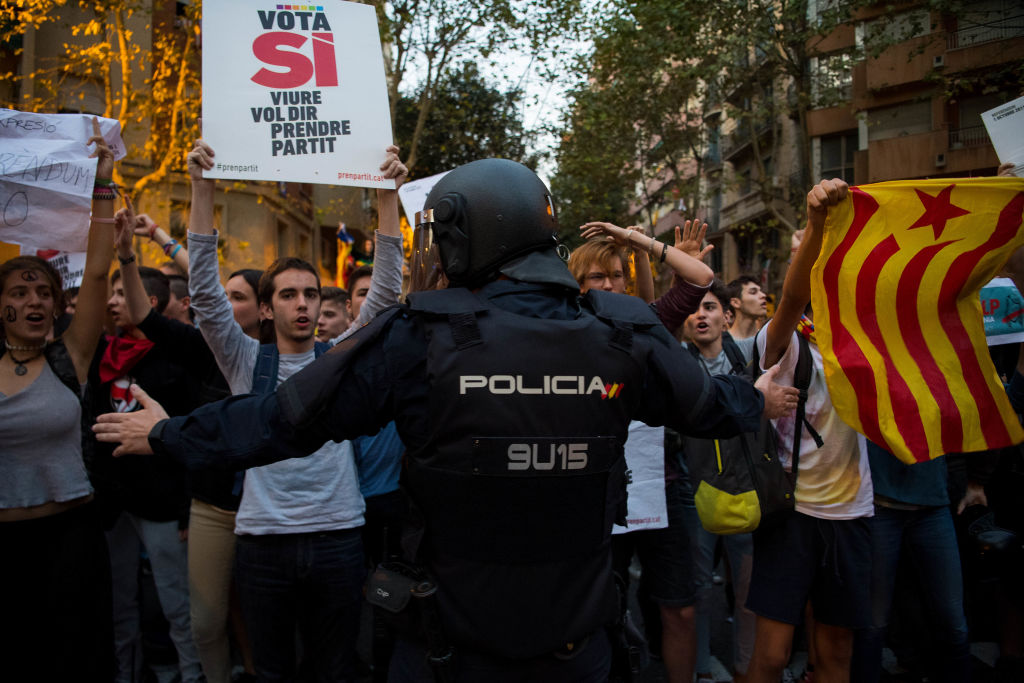As the Catalonian independence battle continues to escalate ahead of the proposed October 1st referendum, Mariano Rajoy’s government is going all-out to thwart the secessionist efforts of Catalan president Carles Puigdemont. As he does so, it is becoming harder to see when or how this increasingly unpleasant conflict will be resolved.
Following the orders of a judge on Wednesday morning, national police raided 42 premises in Barcelona – including several governmental offices – in search of referendum-related materials such as ballot papers and pro-independence pamphlets. They arrested 14 people, amongst them the Economy Secretary General Josep Maria Jové and an advertising professional whose firm is believed to be in possession of material relating to the referendum. For the national government in Madrid, raids such as these are one of only a few options remaining if the October 1st plebiscite – which Spain’s highest court has declared unconstitutional – is to be prevented.
The raids and arrests caused outrage among many Catalans and the streets outside the economy ministry quickly filled up with protestors. By the end of the yesterday afternoon, their number had grown to around 5,000. Demonstrators sung the Catalonian national anthem and waved banners declaring: ‘We are voting to be free’. The protests drew a furious response from Rajoy, who told Puigdemont and his allies to halt the ‘radicalism and disobedience once and for all’, as if he were scolding a child. Puigdemont, meanwhile, called the raids and arrests a ‘democratic disgrace’ and vowed that the vote will go ahead on October 1st however aggressive Madrid becomes in its opposition.
The secessionists in Catalonia have also markedly stepped up their efforts in recent weeks. In cities all over the wealthy north-easterly region, posters have been appearing bearing the image of Spain’s despised Fascist dictator Francisco Franco. In these posters, Franco appears to be directly saying: ‘Don’t vote on October 1. No to the Republic [of Catalonia]’. For more hardline secessionists, Rajoy’s determination to prevent the vote proves that Fascism is still alive and well in Spain, 40 years after Franco’s death.
Posters featuring photographs of Catalonian mayors opposed to the referendum have also been put up. This has resulted in the vilification of anti-referendum Catalonian politicians: Jordi Ballart of the Catalan Socialist Party (PSC), which is against the October 1st vote, says he’s been called ‘a bad Catalan, a moron [and] despicable’ by Catalans in favour of the referendum. The proposed plebiscite is causing heated discord within Catalonian politics as well as between the governments in Madrid and Barcelona. Catalans in general are also split: the latest polls suggest that, although 70 per cent are in favour of the referendum, 41 per cent oppose secession and 49 per cent support it.
Further inflaming the bitter animosity between Madrid and Barcelona, Spain’s foreign minister Alfonso Dastis said in an interview this week that the independence movements’ poster campaigns showed that secessionists possess a ‘Nazi attitude’. ‘This is not something you see in a democracy’, stated the minister.
Actually, poster campaigns that stigmatise the opposition party and politicians suffering ridicule and abuse for their beliefs are frequently seen in democracies. Rarer sights in democratic countries, though, are police raids on governmental offices and the confiscation of pamphlets and posters that express an opinion of which the government disapproves. In addition to yesterday’s raids, Rajoy’s administration has seized 1.5 million pro-independence leaflets and posters since last Friday and 10 million ballot papers.
Confiscating posters and leaflets is unambiguously anti-democratic, yet the Spanish government says that it’s been driven to such measures by the secessionists’ radicalism. On Wednesday morning, Rajoy declared that ‘there is no democratic state in the world that would accept what these people are trying to do’, reiterating that the proposed vote is illegal and will not go ahead. The Spanish daily El Pais concurred in an editorial, arguing that the Spanish government ‘has an obligation to act firmly… to defend the Constitution, democracy and freedoms of all Spaniards’.
Yet that’s precisely what Carles Puigdemont says he’s doing too. As Spain careers towards October 1st, both sides of the secession battle are locked in a vicious circle of rising hostility. Whether or not the vote happens in ten days’ time, it’s unlikely that that circle will be broken anytime soon.






Comments